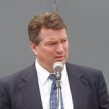
YUKOS-MENATEP EXECS TESTIFY BEFORE CONGRESS
Publication: Eurasia Daily Monitor Volume: 2 Issue: 35
By:

The U.S. Senate Committee on Foreign Relations held a hearing yesterday (February 17) on “Democracy in Retreat in Russia.” The star witnesses were Steven Theede, the embattled Yukos oil company’s chief executive officer, and Tim Osborne, a member of the board of directors of Group Menatep, Yukos’ parent company.
In a written statement provided to the committee and posted on its website, Theede accused the Russian government of carrying out “a ruthless and unprecedented campaign against Yukos by way of dubious and discriminatory taxes, illegal expropriation of property, arrests, and intimidation.” He also said that Russia had reversed its commitment to privatization and “chosen instead to increase the role of the state” while ignoring “the Western-style reformist laws it passed over the past several years when those laws conflict with the interests of the Kremlin.” The result, he said, is that in Russia today, “There are no guarantees of due process, no adherence to the rule of law, and no protections for the rights of shareholders or property owners” (Foreign.senate.gov). Theede also told the committee that the campaign against Yukos had dealt “an important economic blow” to “America’s energy security” (Moscow Times, February 18).
Osborne, in his testimony, detailed the actions taken by the tax and law-enforcement authorities against Yukos and Group Menatep — which, he said, constituted “retroactive application of tax law” and “selective prosecution” — culminating with what he called the “illegal expropriation” of Yuganskneftegaz, Yukos’ main production unit, which wound up in the hands of the state oil company Rosneft.
Osborne maintained that former Yukos CEO Mikhail Khodorkovsky, former Group Menatep director Platon Lebedev, and former Yukos security official Alexei Pichugin — who were arrested in October, July, and June 2003, respectively — are political prisoners. They have been charged with a variety of crimes, including fraud, tax evasion, and (in Pichugin’s case) murder, and they have remained in jail since their arrests. Osborne quoted from a report by the Parliamentary Assembly of the Council of Europe (PACE) released last month that concluded, “The circumstances of the arrest and prosecution of leading Yukos executives suggest that the interest of the State’s action in these cases goes beyond the mere pursuit of criminal justice, to include such elements as to weaken an outspoken political opponent, to intimidate other wealthy individuals, and to regain control of strategic economic assets.”
Osborne also argued, “The trumped-up charges against Khodorkovsky, Lebedev, and others affiliated with Yukos, the unfair nature of their trials, the political motivation of the authorities in the conduct of these cases, and the circumstances of their arrests, detention, and trials” would appear to provide grounds for the U.S. State Department to classify Khodorkovsky, Lebedev, and Pichugin as political prisoners in its forthcoming annual human rights report (Foreign.senate.gov).
The Grani.ru website on February 17 published an appeal by Russian human rights activists to Amnesty International asking the London-based human rights group to classify Khodorkovsky as a political prisoner. Among the appeals’ signatories were leading Soviet-era dissidents Yelena Bonner, Sergei Kovalev, Lev Ponomarev, and Father Gleb Yakunin.
The tenor of the testimony given to the U.S. Senate Committee on Foreign Relations by Theede and Osborne — along with that of other witnesses, including Anders Aslund of the Carnegie Endowment for International Peace and Bruce Jackson of the Project on Transitional Democracies (who called Khodorkovsky’s arrest “the watershed event in the deterioration of democracy in Russia”) — was matched by comments from the committee’s chairman, Senator Richard Lugar. In his opening statement, the Indiana Republican criticized Russian policy in Ukraine and Georgia and accused the Kremlin of stifling economic and political freedoms.
“In recent months, the Kremlin has taken action to stifle public dissent and political opposition,” Lugar said. “Rival political parties have been suppressed, the election of regional governors was canceled, and most of the media has been brought under state control.” He added that this “pattern of behavior” has “spilled into the Russian government’s handling of the economy,” and specifically cited the “campaign against Yukos and Mikhail Khodorkovsky.” The senator also said he thought that President George W. Bush should raise the issue of Yukos during his meeting with President Vladimir Putin in Bratislava on February 24 and suggested that the issue be linked to Russia’s desire to gain membership in the World Trade Organization (Newsru.com, February 17; Moscow Times, February 18).
It should be noted, however, that in recent days Stephen Hadley, Bush’s new National Security Adviser, and Secretary of State Condoleezza Rice, while expressing concern over authoritarian trends in Russia, have seemed at pains to emphasize Bush’s good personal relations with Putin and the need to work closely with Russia on such issues as counter-terrorism and North Korea’s nuclear program. Indeed, Rice told the U.S. House of Representatives Committee on International Relations yesterday (February 17) that, despite concerns about the concentration of power in the Kremlin and the lack of independent media, it would be a mistake to isolate Russia (Newsru.com, February 17).
Some Russian observers also suspect that the Bush Administration will lean more towards realpolitik than Wilsonianism in its dealing with Russia. Grani.ru on February 17 quoted “a source close to Yukos’ main shareholders” as expressing doubt that the Senate hearing would have much impact on U.S. policy. “In his opinion, the problem of democracy in Russia in general and the Yukos case in particular is perceived by the U.S. administration as a kind of ‘chip’ in a diplomatic game, allowing it to demand from the Russian leadership foreign-policy concessions — for example, in the issues of Iran’s nuclear potential or the supply of weapons to Syria.”




